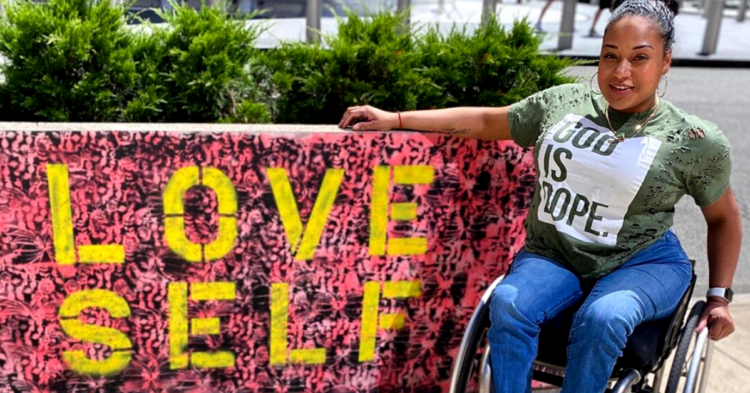An NYC nurse and passionate disability activist who’s been tackling the coronavirus pandemic on the frontlines was surprised with $1 million, money which she says she plans on using to keep helping others.
As Good Morning America reported, 33-year-old Andrea Dalzell from Brooklyn was awarded the million-dollar gift as part of the inaugural Craig H. Neilsen Foundation Visionary Prize, which is “meant to draw attention to and celebrate passionate individuals advancing the world of [the spinal cord injury field].”
When she was 5-years-old, Andrea was diagnosed with transverse myelitis, a neurological disorder that affects her ability to walk.
“I think I went completely numb,” her mom, Sharon Dalzell, told GMA . “I blamed myself for years. I thought I didn’t do something right. I thought there was something I could have done different that would have allowed her to walk.”
Andrea’s dad, Trevor Dalzell, added, “It was very devastating.”
But despite her diagnosis and her parents’ concerns, Andrea proved herself to be a fighter, unwilling to let anything or anyone stop her.
“She grew from five years old to 50 years old,” Shannon recalled. “She was like, Mom, don’t worry, I’ll be fine.”
Even as a kid, she wasn’t afraid to speak her mind to her doctors, even going so far as to argue with them if she didn’t believe they were qualified enough to treat her.
As she grew older and realized her dreams of becoming a nurse, Andrea became even more determined than ever to prevent people from standing in her way.
“She got so much push back on becoming a nurse that it was amazing that she didn’t drop out of the class,” Sharon said. “She’s like, just watch me. Give me a chance to prove myself.”
In 2018, Andrea graduated from nursing school and eagerly anticipated a career of helping people who need her the most. There was just one problem: no one would hire her.
After graduating, she applied for 76 different hospital and clinical nursing jobs, ultimately receiving 76 rejections in response.
As she told Forbes , employers would be interested in her as an applicant on paper, but that interest would wane the second she rolled into the room in her wheelchair, revealing her disability to a room full of doubtful people.
Of course, once the pandemic hit the U.S., it was those individuals who found themselves in no position to be passing up medical workers willing to help out on the frontlines.
As hospitals all across the country became overwhelmed, state governors pleaded for retired and certified nurses to return to the field.
By the end of March, Andrea had a job as a nurse at a hospital in one of the country’s greatest virus hot spots: New York City. She is currently the city’s only RN in a wheelchair, but that’s something she would love to see change.
As she continues facing the pandemic head-on every day, Andrea has remained a passionate activist for people with disabilities.
“People with disabilities aren’t living a death sentence,” Andrea told ABC 7 . “They’re living life, and I get to prove that every day that I’m going to do that. I need to be able to change that narrative for others so if they know that they’re diagnosed with something … that life doesn’t stop there.”
“Life still happens, and it’s up to them to decide if they want to live it.”
In recognition of her continued efforts to help others, Andrea was awarded $1 million from the Craig H. Neilsen Foundation.
She is one of three winners of the nonprofit organization’s first-ever Craig H. Neilsen Visionary Prize , which honors recipients who reflect such values as “extraordinary determination, inexhaustible passion, and an ability to inspire.”
Andrea specifically was chosen as a recipient for her “influence and distinctiveness of [her] contributions to the spinal cord injury community.”
Upon learning she had won $1 million, Andrea immediately knew just how she wanted to spend her unrestricted money — by helping others.
“I want to start a whole program for people with disabilities to get into healthcare,” she said . “They should be given a chance.”
“I need to be able to change the narrative for others so they know that if they’re diagnosed with something, if they acquire a disability, it doesn’t stop there,” she continued. “Life still happens and it’s up to them to decide if they want to live it.”
h/t: Good Morning America , Forbes , ABC 7

















































